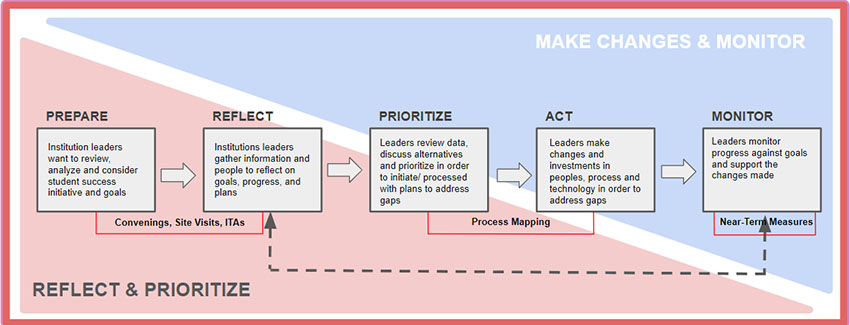Process Mapping
Institutions’ work with the Intermediary Team allowed them to engage in impactful transformative work. The reflection exercises and transparent dialogue that occurred during the convenings and site lead meetings identified process mapping as one of the pertinent levers of the transformation process as integral in helping the institutions reach their goals and desired outcomes.
Discussions at the yearly program reviews and 2019 Institutional Transformation Assessment (ITA) helped the HBCU cohort develop a collective goal of removing program and policy barriers preventing students from persisting to graduation that aligned with the FS’s goals to 1) improve student outcomes and continue progress toward closing success gaps at member campuses and systems, and 2) share insights and resources with additional campuses and systems to set new standards and transform how institutions operate.
Institutions needed improved succession planning to manage leadership gaps caused by retirement and/or the transition of critical leaders to new roles outside the institution. Conversations at these forums resulted in the conceptualization of employing process mapping (PM) as a Continuous Quality Improvement (CQI) model/tool. Thus, the Intermediary Team introduced process mapping, enhancing the CQI process using process mapping as a tool. She facilitated each institution’s engagement in process mapping exercises to assist institutions in closely examining their processes and evaluating opportunities to reorganize and strengthen their processes.
The Continuous Improvement Process is a Helpful Guide for Transformation.

Delaware State University (DSU) and Jackson State University (JSU) saw the most team involvement and transformation by engaging in process mapping from the perspective of efficiency in their current- and future-state process maps. Additionally, DSU would expand its use of data and analytics by creating data dashboards accessible to various touchpoints contributing to student success (i.e., faculty and staff). This also allowed for refinement and the creation of phase II of the Individual Development Plans (IDP). While participating in the FS, DSU held its retention rate steady and saw a slight increase in its 6-year completion rate. Those intimately involved in the change process spoke to its impact. One student shared that the advising has become more hands-on and interactive. The student also reflected upon the institutional transformation through process changes. Faculty, students, and the Office of Engagement synchronized in ways they had never done before. The student stated, “Communication across the whole college has changed. Everyone is on the same page. [There are] less people left in the dark.”
Jackson State University engaged in process mapping to advance its transformative efforts by changing to a centralized advising model to improve the academic advising experience for students In 2019-20. The changes in advising reduced wait times for in-person advising sessions with professional advisors, fostered collaboration across academic units and improved tracking progress to degree completion. The impact of these changes reflected improvements in their 15/30 credit accumulation rate and increases in credit completion ratio, gateway completion rate, and bachelor’s degrees conferred. Process mapping allowed these institutions to understand how processes impact outcomes in both positive and negative ways.
The strategic approach of the Intermediary Team provided them with access to resources, referrals, and information to successfully engage in the process and learn from others in the cohort. Understanding the impact of processes assisted the HBCUs in revamping and investing in their processes and emboldening their transformative efforts.
